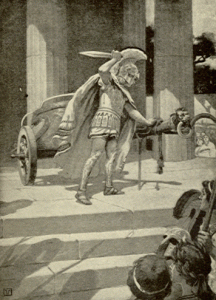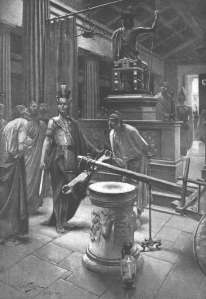
It is Tax Day again in America and some people left their returns to the last minute (as you can see on this photo, which I took in Los Angeles yesterday.) So I’ll take this occasion to muse about the relationship between America’s tax system and freedom.
One year ago today, I offered some “tax day thoughts on complexity in American life.” The gist of that post was that the complexity of America’s tax system, not the rate of taxation, is what harms freedom in this country. Contrary to what you might think if you go to Tea Party rallies, we are not overtaxed, we are badly taxed.
But I did not offer a better — meaning simpler — alternative system. In this post, which I expect to be controversial, I want to do that. (As always, keep in mind that the views expressed on The Hannibal Blog are mine alone, not necessarily those of The Economist.)
There are many proposals out there for a simpler and more efficient tax system: A flat tax, value-added tax, et cetera. I won’t review them all, but instead pick the proposal that I consider simplest, cleanest and boldest.
The Idea
It is the so-called FairTax Plan.
Part of its strength (ie, simplicity) is that I can describe the entirety of America’s proposed tax code in a few short lines:
- America’s existing income and other taxes would be abolished. (Not cut, but eliminated!)
- The IRS and America’s other organs of proto-authoritarian oppression would also be abolished.
- Instead, all Americans would pay a national sales tax, as most Americans already pay state or local sales taxes.
- In addition, all Americans would get a prebate — ie, at the beginning of each year, everybody gets a check.
And that’s it!
The drafters of the proposal think that the rate of this new national sales tax needs to be about 23% to provide the same revenues that we now get from the income tax. It might be 28% or 19%. I’m not the least bit interested in that.
The idea is that we raise as much money as we would otherwise raise through an income tax. As it happens, we would need to collect quite a bit less than we currently do, because we would no longer incur the enormous costs of the IRS bureaucracy, auditors and accountants!
Now for the discussion of the advantages and alleged disadvantages of this new tax system:
Advantages
I think the advantages are self-explanatory:
- You would keep your whole pay check. Ie, your take-home pay would spike right away.
- You would not have to file a tax return.
- No more record-keeping! You no longer maintain mountains of paper for wages, the cost basis of your investments, mortgage deductions, childcare and nannies, et cetera et cetera.
- IRAs, 401(k)s, Roth IRAs, Keoghs…..: You can throw them all into the trash, because all your investments are by definition untaxed.
- Thanks to your annual prebate (which gives you a certain amount of subsequent sales tax “back”), a portion of your consumption is untaxed, too.
- But beyond that, all your consumption is taxed, thus making you think twice about frivolous and unnecessary consumption, which reduces your carbon footprint and clutter.
- Whenever you do consume (either goods or services), you can see the tax you pay on the receipt, in the clearest and simplest manner possible.
- All this amounts to: transparency (replacing opacity) and freedom (replacing anxiety and bureaucracy).
Criticism
There is only one major criticism of this sales tax, but it is a big one, so I want to concentrate on it.
The disadvantage is that this sales tax, like any consumption tax, at first glance appears to be regressive.
In the current system, rich people pay not only absolutely but relatively more of their income than poor people. (There is a reason why I italicized that phrase. Keep reading.) In the new system, poor people (who might need to spend, rather than save, all their income) would seem to pay relatively more of their income than rich people.
And this seems unfair.
Rebuttal
I’ve pondered this for some time. As you may remember, I am a liberal, correctly defined (ie, libertarian but not loony). And I do worry about inequality, which is inevitable in a free society to some extent but in excess (ie, in America) harms freedom.
Part I
My first response to the above criticism is that our current income tax (ie, that which the FairTax proposes to replace) is not fair either!
Warren Buffett has famously explained how he, as a mega-rich investor who does no “tax planning”, pays a lower tax rate than his secretary, who lives off her meager pay check.
Fairness, it turns out, is not about progressive tax brackets. If you have progressive brackets but exceptions to everything (= “complexity”) you get not fair but unpredictable and arbitrary taxation.
So if you do care about fairness, first join me in stipulating that our current system must go.
Part II
My second response is to ask you to re-examine, as Socrates might, what wealth is.
Is it:
- to have vast stores of potential spending power (ie, paper statements of bank balances that produce income)?
- or to consume vast amounts of resources, human and natural, with your own or others’ (borrowed) wealth?
Our current conventional wisdom says 1. So if income is the definition of wealth, then a consumption tax is regressive.
I propose that the correct definition is 2. So if consumption is the definition of wealth (as it used to be for almost all of human history), then a consumption tax is fair.
Example: Croesus and Diogenes
Let me illustrate that point playfully by reviving two characters who have previously featured on The Hannibal Blog:
- Croesus, the ancient king of Lydia who gave us the phrase “rich as Croesus”, and
- Diogenes, the Greek cynic who chose to live in a barrel (and who is a hero of mine).
Let us assume that Croesus and Diogenes are equally rich in our Number 1) definition: Both get huge amounts of income from assets (Croesus from tribute, Diogenes from the equivalent of a trust fund set up by his benefactor, a wealthy Athenian).
Now let’s think about how the FairTax would treat these two rich guys:
Both Croesus and Diogenes would start every year by getting their prebate check. Their basic cost of living, their subsistence, is thereby pre-paid.

Diogenes can buy the few things he needs (dog food, loin cloth, etc) and his prebate covers the sales tax on these items. He pays no net tax at all, in other words.
(Meanwhile, he has millions in his bank account, sitting idle for him, but being lent out to other Athenians to grow the economy.)

Croesus is different. He sneers at his prebate check, which barely covers the sales tax on a single slave, and spends it in a day. Then he keeps spending: Gold, silver, jewels, women, palaces, feasts, galleys, ….
He consumes immoderately and to the detriment of his planet. But he is free to do so (freedom is one of our goals), and nobody even looks askance at him. However, each time he spends, he pays tax, and he knows exactly how much (transparency and simplicity are our other goals).
The years go by, and Diogenes donates his potential (= hypothetical) wealth to an anonymous Athenian. His wealth has been helping the economy all these years, because it was being lent to entrepreneurs. But now the Athenian recipient spends the wealth. And as he does so, he pays tax.
The taxes on Diogenes’ money were therefore only delayed, until such time as his wealth turned from potential into actual consumption. The taxes on Croesus’ money were immediate, because he chose to spend.
Every single dollar in the economy is therefore taxed, but only when it becomes consumption.
At a very fundamental level, this is how it ought to be. We should not calculate equality based on income but on consumption. If I have more than you but live more modestly than you, I should not pay more than you. This is the mental switch I ask you to attempt.
I believe it is fair that Croesus pays lots of taxes all along, but that Diogenes, who never consumes much, does not.
Effect on politics
A final thought about what the FairTax would do to our political discourse and climate.
Our current tax system is as complex as it is because it is the tote bag for our politicians: Any weird political give-away — to owners of gold mines or race horese, homeowners or Prius drivers…. — gets dressed up in Congress as a “tax break” and stuffed into the code. Each time that happens, society as a whole loses, but nobody notices because, well, the tote bag is too messy to see any individual item in it.
Complexity, in short, is the tool politicians and lobbies use to hide things from our attention.
If we switch to the FairTax, the tote bag is dumped and replaced by two and only two numbers:
- rate of sales tax, and
- the amount of the prebate check
Every American could understand this system and therefore participate in our debates about government, funding and fairness.
Should more people be exempt from all taxation? Fine, raise the prebate amount.
Is government too big? Fine, cut the sales-tax rate.
But what what if we still want to help particular groups of people? Earthquake victims or people whose homes are being foreclosed, for example.
Today, we would stuff more gibberish into our tote bag and nobody would notice the cost.
Under the FairTax, we could still help these people, but we would no longer do it through the tax code. We would pay these groups actual cash.
This, of course, would be transparent and easy to measure. Once again, we could all debate whether home owners in foreclosure actually deserve this cash (perhaps not) or whether earthquake victims do (probably).
We would understand what’s going on in our country as well as in our own finances, and understanding is the beginning of freedom.
A shocking thought, isn’t it?


















